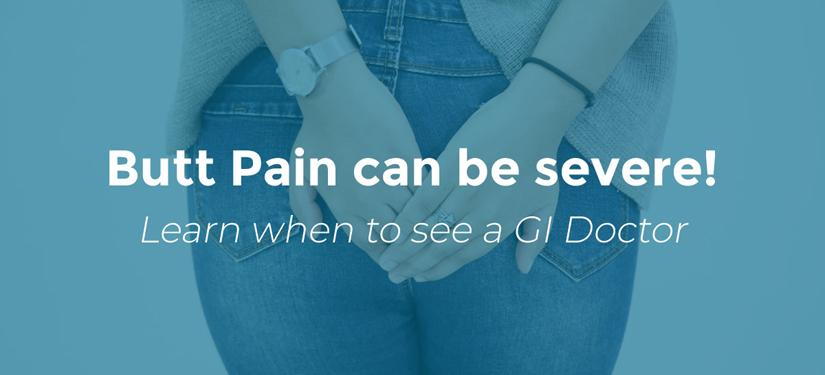Hemorrhoids - 10 Things GI Doctors Want You to Know
posted: Jul. 24, 2019.
You dread going to the toilet. You find it difficult to sit comfortably – even in your favorite chair. Your bottom hurts – and when it doesn’t hurt, it itches. And it’s so embarrassing.
But the truth is hemorrhoids are more common than you realize. Every year 10 million people in the US report their hemorrhoids – and that’s just the people who are upfront about the condition. I’ve seen so many patients who are embarrassed to have hemorrhoids – but it’s so unnecessary!
Hemorrhoids occur when the veins in your anus swell up, much like varicose veins. Because the anus is such a sensitive area, it can cause a lot of pain to sit or poop – especially when clotting occurs.
I would love all my patients to understand the basics of hemorrhoids – because knowledge is power – and I’d like there to be less embarrassment around the subject. Hemorrhoids are common, there are risk factors attached to them, and comfortable ways to treat them. GI doctors want you to know more!
#1 When Should I See a GI Doctor for Hemorrhoids?
If you suspect you have hemorrhoids because you’ve found blood when you wipe, or your rectum feels sore, go see a gastroenterologist for peace of mind. A diagnosis of hemorrhoids may feel embarrassing, but it’s far preferable to the more serious conditions linked to a bleeding anus, such as anal cancer. And GI doctors are experienced in such matters – so there’s no need to feel any shame in the examination room.
A diagnosis also means you can pursue the right treatment. Hemorrhoids and anal fissures are often mistaken for each other, but they need to be handled differently.
You need to seek immediate medical attention if you experience anal pain that increases in intensity or spreads, or you have anal discharge or signs of an infection: raised temperature, fever, or chills.

#2 There Are 2 Types of Hemorrhoids
Not all hemorrhoids are the same. You can have internal hemorrhoids which are largely painless due to their location – unless straining on the toilet causes them to move through your anus to the outside. External hemorrhoids are found around the anal opening and they’re usually swollen, painful, and cause you to have difficulty pooping.
Sometimes external hemorrhoids can have their blood supply blocked by clotting, and they become incredibly painful external thrombosed hemorrhoids – which have an added risk of bursting and bleeding. Internal hemorrhoids are largely symptom free, though they may cause a little bleeding. However, external hemorrhoids can involve chronic pain, a struggle to pass stools, and lumps and swellings around the anus.
#3 Are Hemorrhoids Harmful?
Hemorrhoids are more uncomfortable than harmful, but if a hemorrhoid bleeds for more than 10 minutes, I’d recommend getting it checked out. Very rarely, bleeding profusely from a hemorrhoid can cause anemia. And external thrombosed hemorrhoids are usually so painful that you’ll want to get them sorted out ASAP!
Hemorrhoids in themselves are not harmful in the traditional sense – but they can be harmful to your sense of self-esteem, and your general well-being: you may begin to dread going to the toilet, but the longer you leave it, the more dried out your stools become in your rectum, making their eventual passing even more painful.
As a GI doctor, I want to reassure you that hemorrhoids are perfectly normal – but at the same time I understand it may be embarrassing to use more toilet paper than you’re used to, have to pick up a tube of hemorrhoid cream at the pharmacy, or feel that nagging itch in public. But there’s no need to put up with the uncomfortable symptoms when you can get relief.
#4 Common Causes of Hemorrhoids
Hemorrhoids are common, and although they’re often associated with constipation and pregnancy, these aren’t the only causes. Although the precise mechanism isn’t known, there’s a correlation between increased pressure on the area, and thinning of tissues that contribute to creating the swollen veins that make up hemorrhoids.
Hemorrhoids can be caused by:
- Constipation – Chronic constipation can cause you to strain, but even when you do pass stools, they can be very hard and dehydrated, putting pressure on the delicate tissues of your anus.
- Severe straining – The action of straining hard on the toilet can cause pressure in the anal area.
- Obesity – Obesity and sitting down for long periods of time are both risk factors for hemorrhoids, as it bears increased pressure on the anus.
- Aging – As you become older, the tissues supporting the blood supply to the anus weaken and begin to stretch, making you more susceptible to developing hemorrhoids.
- Pregnancy – As the pregnancy progresses, the weight of the baby puts pressure on the anal region, making hemorrhoids more likely.
Many of these risk factors can be alleviated by drinking plenty of water, exercising, and eating a healthy diet rich in fiber to aid digestion.
#5 How Long Do Hemorrhoids Last?
The question I’m asked a lot by patients is: Can hemorrhoids go away on their own? Unfortunately, it’s not a simple yes/no answer.
The length of time you’re stuck with a hemorrhoid is dependent on a few factors. If you improve your diet, increase your water intake, apply a topical cream, and use damp toilet paper when wiping, you should alleviate your symptoms within a week – if you’re dealing with a mild external hemorrhoid.
Unfortunately, if your hemorrhoid issue is more severe, making these changes is not going to be enough (although it may make pooping slightly more comfortable). When you’re struggling with hemorrhoids that bleed a lot, or cause you severe discomfort whenever you sit down, you may be dealing with a chronic condition that requires specialist help.
#6 Why Do Hemorrhoids Often Itch?
Your anus is a very sensitive area, and when something isn’t right down there, it can lead to inflammation and itchiness. In the case of hemorrhoids, the internal type can drag mucus from the rectum along if they slip outside your anus.
If the hemorrhoid stays prolapsed (outside your body) it may continue to secrete mucus. Your anus can find the mucus incredibly irritating, and this is what creates that unpleasant itchy sensation. Often the itch is made worse when the mucus and your stools combine as you poop.
#7 How Do I Know If What I Have Is a Hemorrhoid or Something Else?
The way to be absolutely sure is to visit a gastroenterologist who can properly examine your condition. After all, it’s all too easy to confuse the symptoms of a hemorrhoid with that of an anal fissure or something more serious.
Overall, it’s worth remembering that the pain of a hemorrhoid is pretty much constant (though often worse when sitting) whereas the pain of an anal fissure is at its highest just after passing a stool (dulling down in between bowel movements). A hemorrhoid often involves a lot more swelling around the area. But to absolutely be certain, I’d recommend getting it examined by a medical professional.
#8 How Can I Prevent Hemorrhoids?
In the case of pregnancy and old age, hemorrhoids are more likely. However, there are a number of lifestyle changes you can make to reduce your chances of developing them in everyday life.
Actions you can take to reduce the risk of developing hemorrhoids:
- Lose weight – Keeping to a healthy weight may prevent hemorrhoids.
- Eat plenty of fiber – Ensuring that your diet is balanced and your digestion is in tip-top condition can aid your avoidance of hemorrhoids.
- Keep moving – Exercising, and avoiding sitting down for long periods of time, can improve your chances of avoiding hemorrhoids. Did you know that hemorrhoids are a known risk for long-haul truckers and other drivers? If you currently sit at a desk for long periods of time, consider investing in a standing desk instead or taking breaks standing intermittently.
Hemorrhoids don’t have to be a cause for worry provided you drink plenty of water, look after yourself, and you don’t wait to visit the toilet when you need to poop.
#9 Do Over-The-Counter Hemorrhoid Treatments Provide Long-Term Relief?
Over-the-counter hemorrhoid creams can provide temporary relief from symptoms and can be of great use when you’re dealing with a mild hemorrhoid outbreak. However, these topical creams can’t treat the underlying cause of the hemorrhoids, so if you’re struggling with them because of your weight or any other long-term issue, you may find that the cream does very little.
Symptom relief from using a hemorrhoid cream usually doesn’t last long, so you may be spending a lot of time reapplying, disappointed that your piles aren’t shrinking. For a more long-term solution, hemorrhoid banding is your best option.
# 10 How Hemorrhoid Banding Works
With the CRH O’Regan Hemorrhoid Removal System a series of small rubber bands are placed around the blood vessels at the base of the hemorrhoids in your rectum, which cuts off the blood supply to the hemorrhoids and causes them to shrink. No anesthesia is needed, and the procedure is quick and simple – taking only a few minutes!
Within a few days, the banded tissue and band falls off in your stool, but here’s the clever bit: the development of scar tissue from the band cuts off the blood supply to the hemorrhoid. So the hemorrhoidal vein still exists, but because its blood supply is diminished, it doesn’t swell and cause problems and pain anymore.
To learn more about the CRH O’Regan Hemorrhoid Removal System, visit my hemorrhoid banding page. If you're concerned about your chronic constipation, or would like to discuss how your digestive health is affecting your daily life with a gastroenterologist in the Dallas/Plano TX area, please fill out our appointment form or call us at 972-867-0019.




